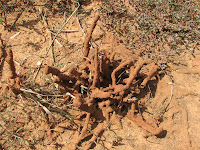Bees in Unwanted Places
As the weather warms up, you may start to notice bees getting a little more active. In fact, you may start to find bee nests in places you would prefer them not to be (a tree in your backyard, under your deck, eave of your home).
We all know that bees are beneficial, but they become a pest when they take up residence in our own residence. Many of us would prefer to have them removed and relocated than killed. In many cases, however, this isn't always possible.
Call your local beekeepers association or check the phone book for a bee removal service. Explain where you are finding the nest, you may luck out and they'll be able to remove and relocate the nest or suggest someone who can.
In most cases, this isn't possible. Especially if the bees are hidden behind a wall, under the eaves of your home, or inside a tree. If it isn't easy to open up the wall and expose the entire nest, it probably isn't possible to remove the colony. Just plugging up the entrance hole is not the solution either. The bees will find a way to get out, and many times this is by chewing a hole in your sheet rock and entering the home. You won't put bees in the beneficial category very long after that!
There has also been a lot of talk about bees disappearing. While this is a serious issue, it has not become a huge issue in Texas, and is most noticeable with beekeeper's bees ("domesticated" bees, if you will) as opposed to wild bees.
As a side note, the second most common question I get is how to determine if the colony is Africanized. In Texas, we just assume that all wild honey bees have the Africanized gene and can be as aggressive. Be careful around bees, you never know how aggressive they may be or what can irritate them.
We all know that bees are beneficial, but they become a pest when they take up residence in our own residence. Many of us would prefer to have them removed and relocated than killed. In many cases, however, this isn't always possible.
Call your local beekeepers association or check the phone book for a bee removal service. Explain where you are finding the nest, you may luck out and they'll be able to remove and relocate the nest or suggest someone who can.
In most cases, this isn't possible. Especially if the bees are hidden behind a wall, under the eaves of your home, or inside a tree. If it isn't easy to open up the wall and expose the entire nest, it probably isn't possible to remove the colony. Just plugging up the entrance hole is not the solution either. The bees will find a way to get out, and many times this is by chewing a hole in your sheet rock and entering the home. You won't put bees in the beneficial category very long after that!
There has also been a lot of talk about bees disappearing. While this is a serious issue, it has not become a huge issue in Texas, and is most noticeable with beekeeper's bees ("domesticated" bees, if you will) as opposed to wild bees.
As a side note, the second most common question I get is how to determine if the colony is Africanized. In Texas, we just assume that all wild honey bees have the Africanized gene and can be as aggressive. Be careful around bees, you never know how aggressive they may be or what can irritate them.


Comments